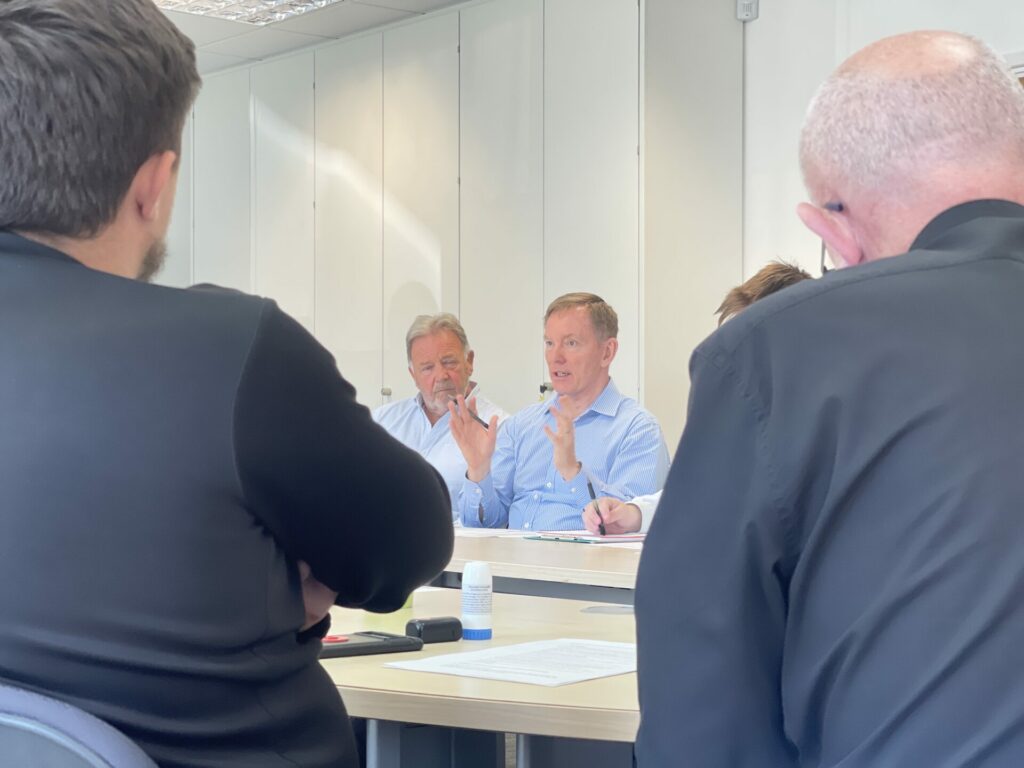Chris Bryant says it’s ‘perfectly legitimate’ for sporting bodies to differ scientifically on trans inclusion
Exclusive: In Attitude's most recent issue the Labour MP discusses changing the political system, the current Conservative government, and trans rights

Sir Chris Bryant loves a long metaphor, as he admits after offering his take on the UK government’s current stasis: “It’s like if you buy a tuna mayo sandwich, you don’t eat it for a couple of days, and it goes past its sell-by date, but you still think ‘I could eat that.’ But then the bread starts curling up at the edges. You could go ‘Maybe if there’s literally nothing else in the flat…’ But it’s when that green crusty stuff appears, and that’s when you know it’s gone. That’s the stage we’ve got to.”
It’s an unusual description but one that aptly captures the current political situation in the UK. In the preamble to our chat, the Labour Member of Parliament for Rhondda, Wales, recalled talking to Tory MPs about business and being struck by the thought: ‘You can’t really do anything. You’ve not got any power anymore. It’s all gone.’
I ask the Welsh MP if he thinks the British public is ready for an election. We’re due one, and it was only days before my chat with Bryant in mid-March that Prime Minister Rishi Sunak (who must call an election to take place no later than 28 January 2025) ruled out the prospect of one happening in May. It’s likely to be the latter half of 2024. Bryant and Labour have cause to be optimistic with polls (at the time of writing) giving them a decent lead over the incumbent Conservatives. “Every opinion poll says that 70–75 per cent of people think it’s time for a general election,” remarks Bryant. “You wander around Parliament, it’s weird because nothing’s happening in the chamber. It’s like tumbleweed everywhere. We finish most days two hours early because there’s no business. But everywhere, Tories are plotting.”
“I have never wanted to be leader of a political party or be prime minister” – Sir Chris Bryant
Politics wasn’t something Bryant aspired to from a young age. Born in Cardiff in 1962, he grew up in Spain. His childhood wasn’t easy — in the past he’s discussed his mother’s issues with alcoholism. Today, however, he reveals a more charming anecdote with his characteristic dry wit: “My mother looked after Shirley Bassey’s wigs many moons ago before I was born, which is probably why I’m gay.”
He then joined the Church. He studied English at Oxford, where despite having had girlfriends, he began to realise he was gay. Although he became an ordained priest, he later left the Church in part due to its attitudes on homosexuality. “The Church didn’t really want gays. I thought, ‘Well, I’m going to leave before my 30th and I want to do something else where I can change the world.’ And the obvious thing was to become an MP. I set myself the goal of becoming an MP by the age of 40.” He was 39 in 2001 when he was first elected the MP for Rhondda, which he’s represented ever since.
It’s clear he made the right decision. Asked what his life would have been like had he stayed in the Church, he replies, “I would have become a very vicious old queen dressed in lace sitting in my battered old armchair drinking pink gin bemoaning the fact that I was not allowed to be in a relationship, and hating every aspect of my own life.”

Reflecting on the Church of England’s 2023 vote to allow same-sex couples to be blessed (earlier last year the Church refused to allow priests to marry same-sex couples), Bryant doubts that it is an indicator of a sea change. “I would say that the Church of England is being glacial, except glaciers these days melt faster. At the rate we’re going, the Catholic Church will get there faster.” While recognising that there are “great people” in the church, Bryant believes the institution has “lost the plot”. However, as per the 2021 census, Rhondda is one of the top three constituencies in Britain where people cite having no religion, so it’s not an issue Bryant spends much time on professionally.
Instead, he is busy with his work as the Shadow Minister for the Creative Industries. Bryant’s view that “nothing seems to work” will ring true with people of all political persuasions. “There’s no money,” he states, before adding that he firmly believes that the key to growing the economy “is not denigrating the creative industries but boosting them”.
Despite his commitment to his work, Bryant is clear about his political ambitions. The day before we speak, I see a tweet asking Bryant why he’s not the Labour leader. In his response, Bryant raised Labour leader Sir Keir Starmer up, while adding that he personally “never” wanted to be prime minister. He remains unequivocal when prodded: “I can categorically, 100 percent, say I have never wanted to be leader of a political party or be prime minister. If they dragged me to Downing Street, I’d run out the back door. I couldn’t abide it.”

Regardless, Sir Chris is more than happy to take on the fight against the Tories. His drive to correct the world’s wrongs is still strong, although I sense age and experience mean that it’s more measured now. “You have to know what you can change and recognise what you can’t and know the difference between the two — or whatever that quotation is from Francis of Assisi, or Mother Teresa, or Kenneth Williams. I can do the things I can do. I can’t do everything,” he says. Having spent time as a minister in government pre-2010 and as a shadow minister during his time in opposition, Bryant is well placed to discuss the workings of Parliament and whether they, well, work.
He admits that he’d change “nearly everything” about the current system. Bryant compares the written-down procedures around the transition of the monarchy to the “arcane and archaic” uncodified procedures of Parliament that can be changed on a whim, lamenting the latter. He cites the 2019 illegal proroguing of Parliament by Boris Johnson as evidence of this. He also uses it as a chance to promote his book Code of Conduct: Why We Need to Fix Parliament — and How to Do It. “Labour should implement every single line,” he says, before adding, “Or maybe not, because there’s a couple of things I now disagree with myself about.”
“There’s a real worry that if we get this wrong, it’s democracy that will be on trial even more than us” – Sir Chris Bryant
I’m keen for specifics, so I focus on whether it’s right that a leader of a party can be changed repeatedly without an election being called. The answer is not clear-cut, according to Bryant. “We would still have Boris Johnson, wouldn’t we? Or Liz Truss,” he concludes, after explaining that if a ruling party changed leader frequently and that resulted in a general election each time, the MPs would never get rid of a bad prime minister. But still, Bryant accepts that a constantly revolving door is good for no one, claiming that since 2019, 190 Tory MPs have served in a ministerial role, accounting for nearly two-thirds of the team in blue.
However, there are signs of progress within Parliament as an institution. Allegations of sexual harassment are now taken seriously, not swept under the carpet as they have been before. MPs have left as a result. Last year, Bryant himself said he’d been groped by five male MPs in his time, with one grabbing his crotch and pushing him up against a wall. Bryant wants to see the ministerial code toughened up, claiming, “It hasn’t got any bite.” He also suspects that a general election could result in a big “clear-out”.
Careful not to place too much weight on opinion polls, Bryant’s recent experience in running Labour’s campaign for the Kingswood by-election (Labour took the seat from the Tories with a 2,501 majority) appears to have given him confidence in what a general election result could look like for Labour. “Confident is the wrong word,” Bryant corrects. “We’re not complacent.”
And how would Labour differ from the 13 years of Conservative government? Last year, Bryant told Sky News’s Kay Burley that “the most important thing is we learn how to be a proper, competent government. One that embraces standards in public life. One that doesn’t pretend to be one thing whilst being another.” In Bryant’s eyes, Labour has to be that or risk pushing people further towards political and democratic apathy. “There’s a real worry that if we get this wrong, it’s democracy that will be on trial even more than us. But I think Sir Keir Starmer has a sense of what is a proper way to do things in Parliament, and we’ll want to abide by that.”

With the mention of the Labour leader, we discuss the party’s stance on trans rights, which has become murky in the past year. Where once the party definitively stood for self-identification and Starmer could confidently state “Trans women are women, and that is not just my view,” now it is the opposite. Recently, Starmer stated that it was up to sporting organisations to decide if they were to impose bans on trans athletes. It was framed by many as Starmer supporting the idea.
My question on this is cut short by Bryant, who wishes to correct the angle. He “completely” agrees with Starmer. “I’m a passionate supporter of trans people, and I hate it when [Equalities Minister] Kemi Badenoch goes on about an ‘epidemic’ of trans [people] like it’s some kind of contagion. That’s despicable. But I think it’s perfectly legitimate for individual sporting bodies to go, ‘This is what works scientifically in our sport as opposed to another sport.’”
For Bryant, it’s “gut-wrenching” to see LGBTQ+s shouting at Labour politicians, who, he argues, have always stood with the community. “Virtually every advance in LGBTQ rights has been thanks to Labour. This has always been part of who we are, that everybody should be treated equally under the law. That’s why the Equality Act was introduced as one of the last things that we did under Gordon Brown in 2010.” When asked whether he’s worried about Labour losing support from the LGBTQ+ community over its flip-flopping over such key issues, he responds, “I’m more worried that we’re entering an era when people think that trans people are the people that we can all dump on.”
“I have it very clear in my head that it is definitely LGBT. You can’t have the LGB without the T”
I bring up conversations I’ve had with people who have called on Labour to “step up” on LGBTQ+ rights. Again, the Welsh MP points to Labour’s record, which he says is “pure diamond”, before going on to list the outlawing of anti-LGBTQ+ discrimination in the provision of goods and services; civil partnerships; repealing the gay military ban; and allowing same-sex adoption. “Nobody expected that we’d be able to do that,” he continues. “That’s where I point people to. I have it very clear in my head that it is definitely LGBT. You can’t have the LGB without the T.”
While I understand that Labour’s record says a lot, the point I’m trying to make is that it’s the party’s current actions and words that are causing upset. As I attempt to continue my line of questioning, an audibly frustrated Bryant interjects, saying we’ve spent “almost half the conversation” discussing LGBTQ+ matters. It’s only been six minutes and 22 seconds. We spent the first 28 minutes and 46 seconds of the 44-minute-and-25-seconds-long interview discussing Parliament and general politics.
We then address the question of self-ID. Last July, Starmer confirmed the party was backtracking on this issue, saying, “A woman is an adult female.” Echoing past statements on the matter, Bryant says, “Men have penises. Women have vaginas, and some people do not fall neatly into that either for medical or sociological or for whatever other reasons.” He adds, “We should be as generous as we possibly can to enable everybody to live the life that is right for them. That’s the society that I want us to build. The precise details about what age you should be able to do this, that, and the other, I think that’s a matter for evidence-based science rather than politicians mouthing off.”
This feature first appeared in Attitude issue 358, available now.
